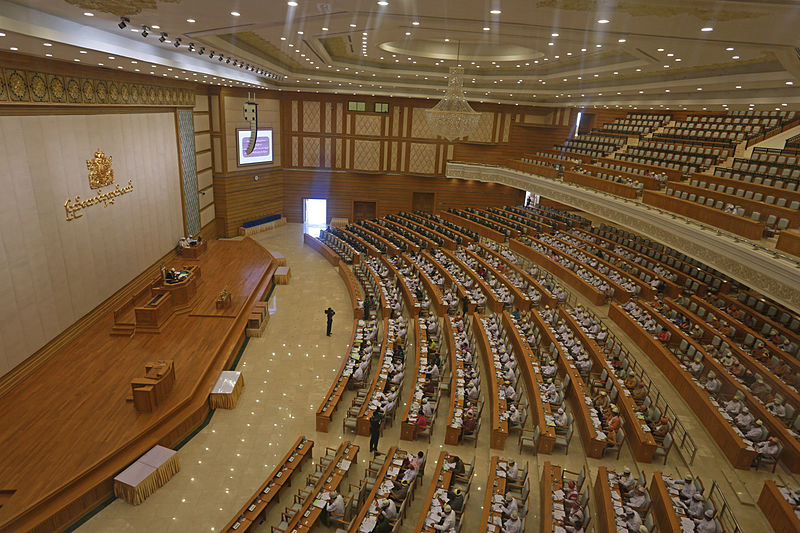Burma’s parliament began its much-anticipated debate on whether to amend the 2008 Constitution on Thursday. The debate is expected to focus on the findings of two parliamentary committees, the Joint Parliamentary Constitution Review Committee and the Committee for Implementation of 2008 Constitution Amendment.
During Thursday’s debate, MPs from the opposition National League for Democracy (NLD) and ethnic political parties attempted to steer the agenda towards amending Articles 436 and 59(f) of the Constitution. The former guarantees the military veto power over constitutional amendments, while the latter prohibits Aung San Suu Kyi from running for president.
Military MPs focused their comments on Article 201, which they said should be changed to empower the National Defence and Security Council (NDSC)—already a supremely powerful government body under the Constitution—to dissolve parliament if one-third of parliamentary seats are vacant.
Phyo Min Thein, a NLD lower-house MP from the Rangoon area, told DVB that during the debate, “[Opposition] MPs focused on power decentralisation and amending Article [59(f)], stressing that the Tatmadaw should not retain its leadership role in national politics. Rather, they said political power in Burma should be granted to the masses [acting through duly elected representatives].”
“But military MPs insisted that Articles 436 and 59(f) should be kept as they are, and instead suggested that Article 201(a) should be amended, a move that would [centralise power even further by enabling] the NDSC to recommend the dissolution of parliament [and call new elections],” he said.
The NLD, in collaboration with civil society group 88 Generation Peace and Open Society (88GPOS), launched a nationwide campaign earlier this year to garner public support for amending Article 436. After their campaign, the two groups presented parliament with a petition signed by around five million people in support of amending Articles 436 and 59(f).
By contrast, a report submitted by the Constitution Amendment Implementation Committee on 22 October indicated that military MPs did not want to amend Articles 436(a) and (b).
Phyo Min Thein said that military MPs expressed support for a Constitutional amendment which requires mandatory consultation with the NDSC when considering prisoner amnesties and peace talks. Military MPs also insisted that Article 201(a) should be amended to empower the NDSC to dissolve parliament and call new elections if more than one third of parliament resigns.
[related]
The NDSC is composed of Burma’s president and vice-presidents; parliament’s upper and lower-house speakers; the military’s commander in chief and vice-commander in chief; and the ministers of defence, home affairs and border affairs.
Yan Myo Thein, a political analyst, said the situation in the parliament shows that it will be very challenging to amend the constitution under existing parliamentary procedures.
“Based on what I’ve seen in the report by the parliament’s Constitution Amendment Implementation Committee, Tatmadaw MPs are firmly…opposed to [amending] certain articles in the constitution. This shows that any efforts to amend the Constitution in parliament will be very challenging,” he said.
During Thursday’s debate, lower-house representative Ba Shein said that amending Article 436 is the key to constitutional reform. Ba Shein is one of 140 Burmese parliamentarians involved in the debate, a process that will continue until 25 November.
In her recent visit to Karenni State, Aung San Suu Kyi urged the public to closely follow the debate.



